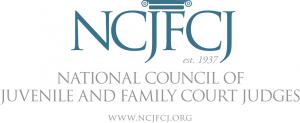NCJFCJ Recognizes Child Abuse Prevention Month
April is National Child Abuse Prevention Month, and is an opportunity to highlight a system of care for those children victimized and traumatized by abuse.
The work of the NCJFCJ has several initiatives and programs so that judges in their communities can oversee positive outcomes in child welfare matters. The Child Abuse and Neglect Institute, created in 1996, provides training in dependency court best practices for judicial officers. This week-long program brings together national and local faculty to teach on core topics including hearing practice, child development, substance abuse, and cutting-edge court improvement developments, among other topics.
The NCJFCJ’s Enhanced Resource Guidelines serves as the national blueprint for education and training on child abuse and neglect practices. The Enhanced Resource Guidelines covers all stages of the court process, from the preliminary protective hearing until juvenile and family court involvement has ended, which leads to the child safely being returned home or placed in a new, secure and legally permanent home. Currently, practices from the Enhanced Resource Guidelines are being applied to 14 court sites nationwide, through the NCJFCJ’s Implementation Sites Project, which fulfills the goal of improving the outcomes for children in care.
The Implementation Sites Project engages selected jurisdictions in cutting-edge program, policy, and initiative development to reduce the number of children in foster care and improve the outcomes for children in care. The Implementation Sites Project seeks to accomplish its goals through guiding and assisting lead judges and collaborative team members in assessing current practice, implementing best practices outlined in the Enhance Resource Guidelines, gathering data, measuring performance and participating in ongoing training opportunities.
“The federal government has decided judges are the gatekeepers for what happens and doesn’t happen in the life of a child in foster care,” said Judge Egan Walker, Washoe County Second Judicial Court and board director of the National Council of Juvenile and Family Court Judges (NCJFCJ). “It, therefore, falls to me to be educated and informed about what works for kids, about trauma and trauma-informed practices, and to really elevate the best interests of a child above the interest of any of the individual players in the system.”
Grace, a previous foster youth, shares her story during this important month of awareness, and how her CASA (Court Appointed Special Advocate), Susan, served as her voice in court. Grace’s story happens too frequently for youth who disclose abuse or neglect. Today, more than 900 abused and neglected children live in foster care in Washoe County because they cannot live safely at home. Each year more than 400,000 abused and neglected children are in foster care in the United States.
When these children are removed from their homes and placed in foster care, they are often placed with caregivers that they have never met. These children are away from everything familiar, while entering into a world filled with social workers, lawyers and judges making life-decisions on their behalf. CASA volunteers advocate for an abused or neglected child in family court proceedings.
Being forced to relive abuse day after day is re-traumatizing and confusing for children, exacerbating trauma symptoms. Virtually everyone who has worked in child welfare acknowledges that there must be a better way to help children in need.
In 2008, Prevent Child Abuse America introduced the pinwheel as the new national symbol for child abuse prevention through Pinwheels for Prevention®. The pinwheel connotes whimsy and childlike notions. In essence, it has come to serve as the physical embodiment, or reminder, of the great childhoods we want for all children. Members of the NCJFCJ, Washoe CASA Foundation and more will be gathering in a pinwheel garden on April 20th in Reno, Nev. for National Child Abuse Prevention Month. The pinwheel garden will consist of 365 pinwheels, one for every day of the year.
To learn more about the National Council of Juvenile and Family Court Judges, visit ncjfcj.org.
About the National Council of Juvenile and Family Court Judges (NCJFCJ):
Founded in 1937, the Reno, Nev.-based National Council of Juvenile and Family Court Judges, is the nation’s oldest judicial membership organization and focused on improving the effectiveness of our nation’s juvenile and family courts. A leader in continuing education opportunities, research, and policy development in the field of juvenile and family justice, the 2,000-member organization is unique in providing practice-based resources to jurisdictions and communities nationwide.
Chrisie Yabu
KPS3
775-686-7437
email us here
April is National Child Abuse Prevention Month. This is Grace's Story.
Legal Disclaimer:
EIN Presswire provides this news content "as is" without warranty of any kind. We do not accept any responsibility or liability for the accuracy, content, images, videos, licenses, completeness, legality, or reliability of the information contained in this article. If you have any complaints or copyright issues related to this article, kindly contact the author above.


